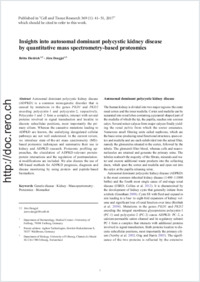Insights into autosomal dominant polycystic kidney disease by quantitative mass spectrometry-based proteomics
- Diedrich, Britta Department of Dermatology, Medical Center—University of Freiburg, Germany - Agilent Technologies, Waldbronn, Germany
- Dengjel, Jörn Department of Dermatology, Medical Center—University of Freiburg, Germany - Department of BiologyUniversity of Fribourg, Switzerland
-
01.07.2017
Published in:
- Cell and Tissue Research. - 2017, vol. 369, no. 1, p. 41–51
English
Autosomal dominant polycystic kidney disease (ADPKD) is a common monogenetic disorder that is caused by mutations in the genes PKD1 and PKD2 encoding polycystin-1 and polycystin-2, respectively. Polycystin-1 and -2 form a complex, interact with several proteins involved in signal transduction and localize to discrete subcellular positions, most importantly the primary cilium. Whereas the causative mutations leading to ADPKD are known, the underlying deregulated cellular pathways are not well understood. In the current review, we introduce state-of-the-art mass spectrometry (MS)-based proteomic techniques and summarize their use in kidney and ADPKD research. Proteomic profiling approaches, the elucidation of ADPKD- relevant protein-protein interactions and the regulation of posttranslational modifications are included. We also discuss the use of MS-based methods for ADPKD prognosis, diagnosis and disease monitoring by using protein- and peptide-based biomarkers.
- Faculty
- Faculté des sciences et de médecine
- Department
- Département de Biologie
- Language
-
- English
- Classification
- Biological sciences
- License
-
License undefined
- Identifiers
-
- RERO DOC 306695
- DOI 10.1007/s00441-017-2617-9
- Persistent URL
- https://folia.unifr.ch/unifr/documents/306243
Statistics
Document views: 83
File downloads:
- pdf: 236
